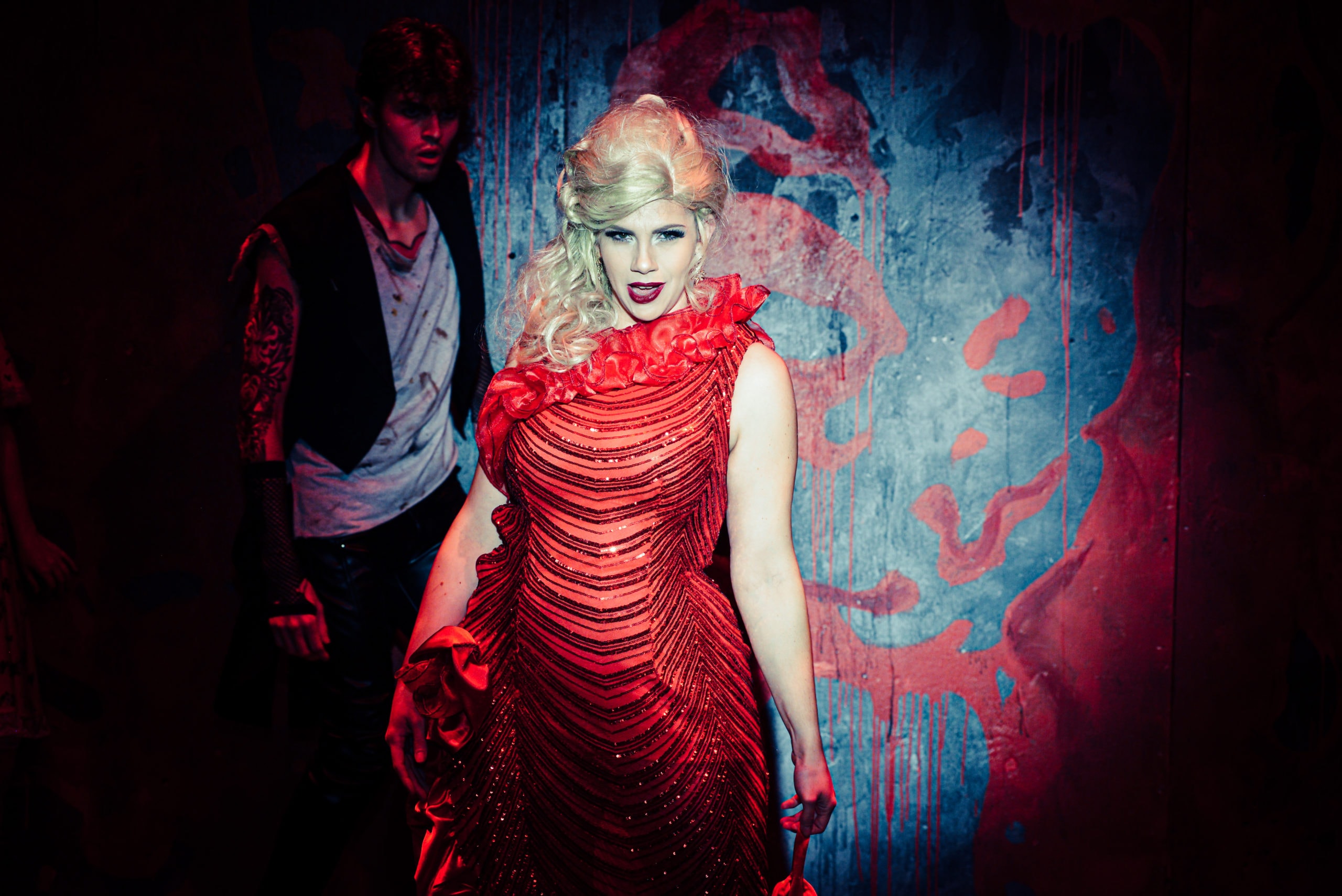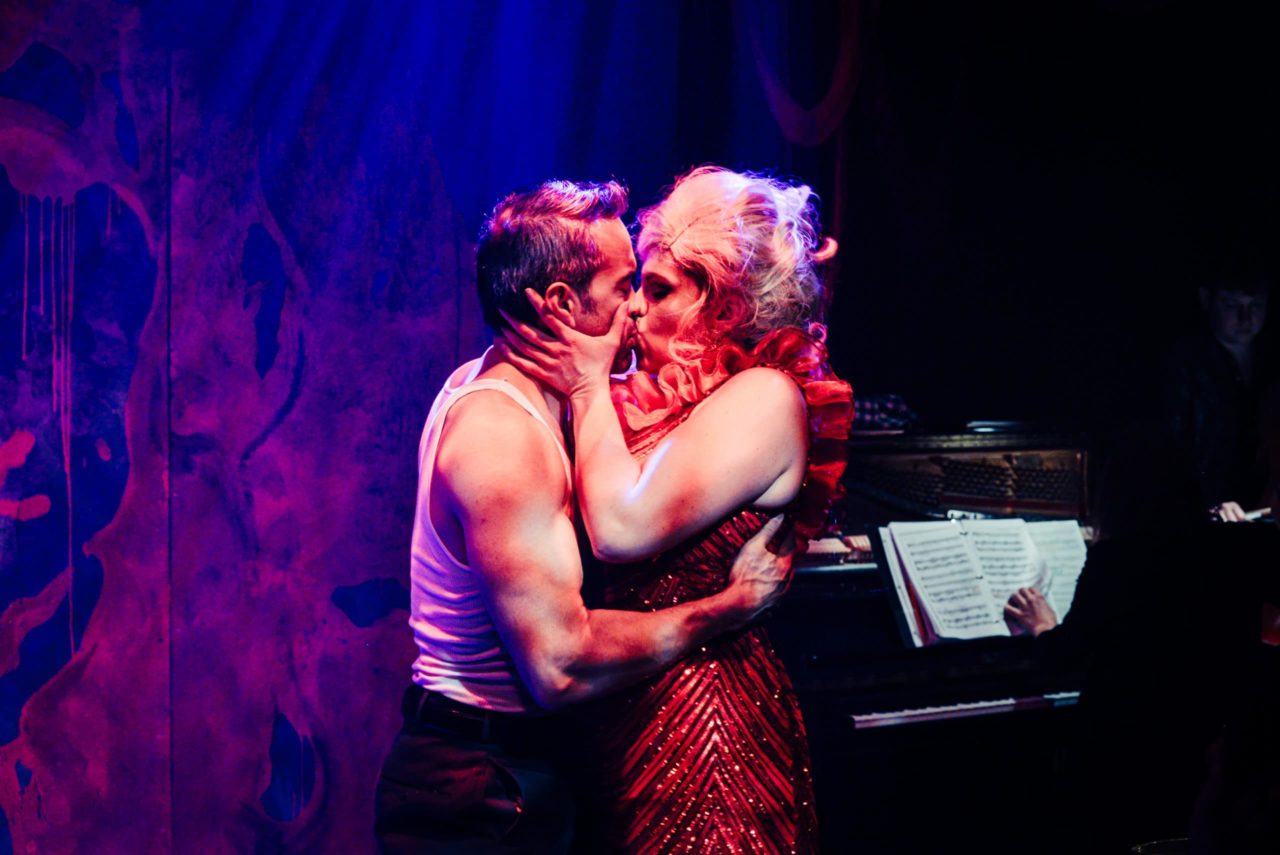“I want us to be in contention for a Helen Hayes Award,” IN Series artistic director Timothy Nelson told me last fall over coffee near his office in the Shaw neighborhood. We were discussing his ultimate goal of creating a demand in DC for a dramatic arts genre that blends opera with theater. “It’s hard to sell new interpretations in this city because there is so much theater already going on, and it’s the theater audience that I want,” Nelson said.

Not long after IN Series founder Carla Hübner handed over control to Nelson, he re-branded the 40-year-old company as “Opera that speaks, theater that sings.” It is this neither-one-nor-the-other quality of Nelson’s productions that make them difficult to place in the context of what opera-goers in particular expect. Such is the case with his Le Cabaret de Carmen which opened at the Source Theater this weekend.
Based on the opera Carmen by Georges Bizet, in this production, there is no orchestra pit between performers and ticket holders. Instead of three hours (excluding intermissions), this performance runs about 80 minutes, with no intermission. There are only four singers, two actors, and three musicians, most of whom are locally sourced. There is a stage director but no conductor. Instead of supertitles, slides with the French-to-English translations are projected on the wall in scrolly frames, à la silent movies. Sequins and ruffles replace robes and flounce.
Set as an early 20th Century cabaret, some audience members are seated on stage, allowing the sadistic Madame Pastia, a non-singing role fiercely played by Lydia Gladstone, to occasionally bemuse them with racy taunts before wandering into the house to cast a little shade on other patrons. This kind of improvised staging is encouraged by Nelson. “It changes from night to night, according to the mood of the audience,” he told me after the show. It’s yet another point of departure for how opera is traditionally produced.
Bizet based his 1875 work on a Prosper Mérimée novella in which an imprisoned soldier teeters into madness and goes on a murderous rampage, with the eponymous character as his final victim. In 1981, the English theater director Peter Brook, a hero of Nelson’s, rejiggered Bizet’s work as La Tragedie de Carmen into a piece stripped clean of all but the central characters and more than half of its original score. In a program note, Nelson lauds this approach, but critiques Brook’s unwillingness to fully explore the work’s abject cruelty. The IN Series version includes a rape scene (which is why there is an “explicit content” warning on the website), knife fights over seemingly inconsequential slights, and Gladstone punching the private parts of her whore-employee Carmen, sung by the sexy, transcendent mezzo-soprano Cara Schaefer.

“This is more how Bizet intended it before he was convinced to change it,” Nelson told me after the performance, referring to the opera stylists who urged Bizet to soften the show’s overt darkness.
Nelson worked with cellist and tanguero Maxfield Wollam-Fisher to liberally deconstruct and re-shape the libretto and score. Rather than arias, there are saucy cabaret numbers, lounge acts, and sung meditations that move the plot along rather than merely serve as vehicles for bel canto flourish, although there is plenty of improvisational interplay between the cast and the tango trio comprised of Wollam-Fisher on cello, Heyni Solera on bandoneon, and Emily Baltzer at the piano. Their expert, soulful playing is worth the price of admission alone.
“Emily brought the Carmen, we brought the tango,” Wollam-Fisher told me after the show. Baltzer is a sought-after opera coach and accompanist, while Solera is just back from a year spent honing her craft playing with various tango orchestras in Buenos Aires. Wollam-Fisher founded the Da Capo Tango Orchestra.
None of these inventions, which include Carmen’s “Habanera” and “Seguidilla”, and Escamillo’s “Toreador”, negate the need for the singing cast to be operatically trained. Still recognizable, yet remarkably different, the score is just as demanding as the original; perhaps more so because opera as a contact sport, viewed ring-side, sung as though in conversation, modulated for a small venue, and performed without a conductor in a tango format requires, as you would expect, intense focus and technique.
The cast was more than up for the task, each of them fully inhabiting their character. Micaela was sung with beautiful skill by coloratura soprano Kelly Curtin who imbued her role with the alacrity of an ingénue aware she is out of her depth in Carmen’s bawdy and aggressive world, but who is nevertheless unwilling to back down. In an acutely memorable scene, Curtin and Schaefer are literally bonded in blood and their mutual awareness that no matter how powerful each woman might feel in the moment, they will always remain powerless in the world they inhabit.
If this brave new world of opera is to survive and thrive, tenor Brian Arreloa as the soldier Don José will be among its standard-bearers. His capacity for vulnerability both vocally and dramatically was on par with Schaefer’s. Together, they defied what I have come to disdain as the perfect, but perfectly boring sound of today’s factory-like approach to turning out classically trained singers. Instead, theirs is the kind of singing that might surface an occasional flaw but which is consummate in its power to communicate authentically. This is what can happen when a director trusts his cast to trust themselves.
Also worth noting is Arreola’s moving delivery of Wollam-Fisher’s gorgeous interpretation of the “Flower Song,” threaded here with strains of Bizet’s other popular opera, The Pearlfishers, and the Dies Irae, marking the inevitable string of deaths to come. Bravo.
Peruvian baritone and University of Maryland alumnus Alex Alburqueque served up the role of Escamillo with a macho campiness that was part slapstick comedian, part lounge lizard, and with his resonant voice, definitely part divo. His take on the prissy but brave bullfighter injected necessary comic relief at just the right moment and set the stage for his excellent performance of the “Toreador’s Song,” one of opera’s most recognizable tunes.
Rounding out the cast was Washington theater newcomer Kyle Dunn who was appropriately sullen as Madame Pastia’s nasty cabaret host and offered the right amount of menace as Carmen’s rapist.
Despite the show’s relentless coarseness, its intimate immediacy kept the audience invested. It is not opera for those whose primary thrill is high notes, but it is opera for those unafraid of art’s raw power.
Although Bizet considered his work a failure, it has proved his most enduring as one of the world’s most performed operas of all time. When Brook’s La Tragedie de Carmen played in New York in 1983, it was panned by a New York Times critic who decried Brook and others like him for their belief that “opera should be treated as a theatrical show with musical underpinnings.”
Which is to say, in opera, tradition is a hard habit to break.
Whether Nelson can carve out and sustain a niche in the DC theater scene with his hybrid brand of opera, only a few more seasons will tell. One sign might be that before the performance, he confided his company had already sold more tickets by opening night than any other he’s staged in his DC tenure so far. Another is that an extra matinee show has been added to meet demand.
Running time: Approximately 80 minutes, with no intermission.
Le Cabaret de Carmen plays through January 19, 2020, at the Source Theater, 1835 14th St NW, Washington, DC 20009. For tickets, call (202) 204-7800 or go online.
Additional credits:
Donna Breslin, costume design
Marianne Meadows, lighting director
Jonathan Dahm Robertson, technical director and set design
Juan Carlos Rincones, movement director
Joe Gladstone, stage direction.




